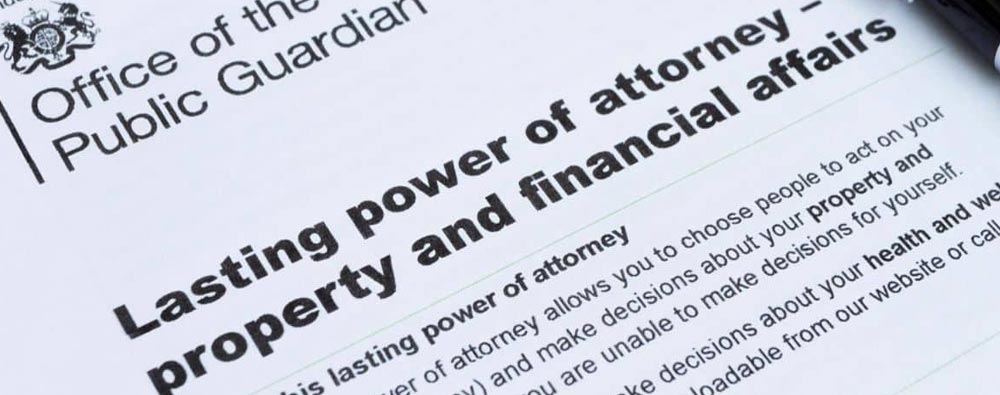A power of attorney is a way of appointing somebody to legally act on your behalf, so that they can do such things as go to the bank for you, ‘phone utilities companies and generally do anything that you yourself would ordinarily be able to do.
There are a number of different powers of attorney in existence and the law concerning them has changed considerably since 2007. Lasting Powers of Attorney (‘LPAs’) tend to be the type most widely recommended since they continue to be valid if the person who made the LPA loses their mental capacity. Regrettably, too many people have either not heard about powers of attorney or mistakenly believe that they are either too young to be concerned about it or that they are not at risk of losing their mental capacity. Oh to have such foresight!
LPAs comprise two separate documents – a Health and Welfare LPA and a Property and Financial Affairs LPA. The former allows the Attorney to make decisions such as where the person lives, what they eat, even who they socialise with, as well as what medical treatment they do or do not receive. This can even extend to life support, since in the LPA you can state whether your Attorney is able to make this decision or whether this should be for Doctors and nursing staff to decide instead. An Attorney can only act for you under this type of LPA if you lose your mental capacity. Under the Property and Financial Affairs LPA, your Attorney can withdraw money from your bank account and spend it on your behalf, set up direct debits, sell shares, buy and sell property and generally deal with anything that needs to be done, unless you state otherwise in the LPA. An Attorney can act under this type of LPA once it has been registered with the Court. Therefore an LPA is not just concerned with the loss of mental capacity but can be useful if the person becomes hospitalised, housebound or simply does not want the bother of having to deal with their personal matters and affairs anymore.

Why is having an LPA important?
There is no requirement in law for a person to make an LPA, but if there is no LPA and the person loses their mental capacity then the consequences can be severe. A Deputy would need to be appointed by the Court of Protection so that the person’s property and finances can be handled; this is an extremely expensive, very long-winded process which can cause a lot of stress to the family. Without the Health and Welfare LPA in place then Social Services can decide where the person lives and Doctors can decide what medical treatment the person receives; such decisions might be made without the family’s opinions being sought or taken into consideration.
People often mistakenly equate making an LPA with handing over control over their finances. This is not the case, since you can carry on dealing with your financial and personal affairs for as long as you wish. We often liken LPAs to an insurance policy in that they can be taken out, put away and forgotten about until they need to be used.
The registration of Enduring Powers of Attorney
As well as advising on LPAs and other powers of attorney, we can also undertake the registration of Enduring Powers of Attorney and LPAs. We also offer a Certificate Provider’s service, whereby an LPA is ‘signed off’ to confirm that the person making it is aware of what they are doing and is not being pressurises into doing it.
We always provide fixed fees. As with all our services, we will always provide a free initial meeting where we can discuss what your requirements are before advising on the way forward. There is never any ‘hard sell’ and no obligation for you to instruct us.
Charges & fees
We charge £225 plus VAT at 20% to set up an LPA and this includes attending the client to take their instructions, providing the client with a draft of the LPA, attending them to sign the LPA and acting as their Certificate Provider, undertaking the registration of the LPA with the Office of the Public Guardian (who charge a fee to register each LPA, although the fee can be waived or reduced depending on the client’s financial circumstances) and providing the client with a certified copy of the LPA at the conclusion of the matter.
Specialists Solicitors for the elderly & official member of ‘STEP’
THE SOCIETY OF TRUST AND ESTATE PRACTITIONERS
The Wills, Probate & Elderly Client Specialist
We are a niche practice specialising in Wills, estate administration (commonly known as ‘probate’) and matters affecting older people such as Powers of Attorney.
The owner of the firm is Luisa Nicholson, who qualified as a Solicitor in 2003. In 2013 she was appointed HM Assistant Coroner for Exeter and Greater Devon.

Over 20 years
EXPERIENCE
We want to provide you with the best possible service. However, if at any point you become unhappy or concerned about the service we have provided then you should inform us of your concerns immediately so that we can do our best to resolve them.
If we cannot resolve your complaint then you can approach the Legal Ombudsman. They will look at your complaint independently and it will not affect how we handle your case.




